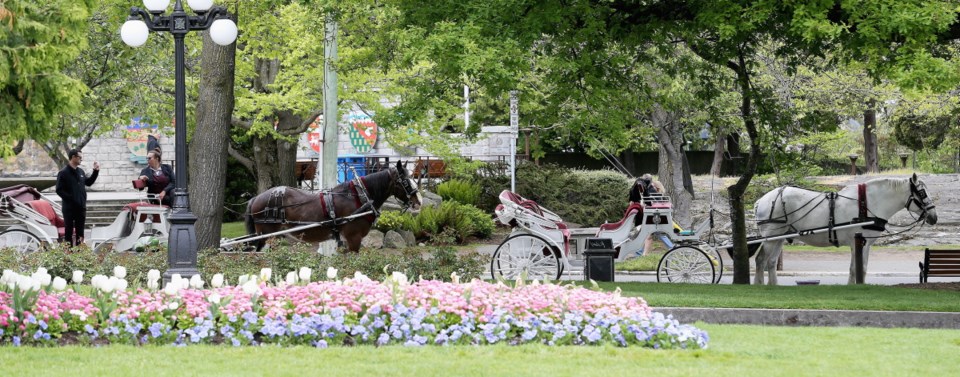In the face of public opposition, Victoria Coun. Ben Isitt has backed off his call for a ban on horse-drawn carriages by 2023.
Isitt is still pushing for greater regulation of the industry but as the clock ticked near midnight Thursday, councillors deferred further action until after it hears from an SPCA delegation to clarify that organization’s position on the industry.
Isitt’s call for a city-staff report on implications of banning the carriages from city streets by 2023 drew a deluge of some 1,000 emails, brought out hundreds of protesters to city hall Thursday in support of the carriage industry, and prompted dozens of speakers on both sides of the issue to address council.
“As a local resident who has to watch these horses day in and day out in my neighbourhood I feel ashamed to be a part of a city that sees this industry as charming or a romanticized piece of what Victoria is supposed to be about,” Tayler Zavitz, who described herself as a sociologist and animal studies scholar, told councillors. “In James Bay alone I have personally documented consistent issues with the horse-drawn carriages, everything from the issue of urine and feces in the street to severe traffic problems with delays resulting in frustrated and erratic drivers who then cut carriages off.”
Zavitz said the horses are forced to work in a dangerous environment “with loud constant levels of traffic noise into highly populated and busy tourist areas, having to pull heavy carriages across hard pavement all while breathing in exhaust fumes.”
Donna Friedlander, owner of Tally-Ho Carriage Tours and industry spokesperson, told councillors she was “shocked” that the issue of a possible ban had been resurrected after the city only last August extended for five years the stand lease for the carriage companies.
She said the industry, which consists of two businesses with 70 staff and 55 horses, has worked closely with the city and the SPCA and followed every recommendation the SPCA has ever made. “We go far beyond our regulations in our own operation to keep us safe.”
She said many opponents now concede the horses are well cared for but criticize having horses in traffic. “What’s really important to note here is we do not operate in high traffic areas of the city. Eighty-five per cent of our time we’re either in quaint streets in the James Bay neighbourhood or we’re in Beacon Hill Park,” Friedlander said.
“The other 15 per cent, I guess, is thoroughfares. We’re going from our sightseeing stand at Belleville and Menzies and travelling into the park or into James Bay.”
Some people said industry claims that without the carriage business, the horses would end up slaughtered for meat was fear mongering. “I am shocked at how quick these companies are to use their horses’ lives as a weapon against banning the carriages. This seems like a conditional view of love on family members in that a family member can remain as such as long as they’re earning us money but the moment they don’t earn us money they may or may not end up as meat,” said Kari Sloane.
“One of the things that everyone agreed on tonight is that they’re passionate and love the animals, said Coun. Charlayne Thornton-Joe.
Isitt said that public debate over the issue had resulted in “ad hominem” attacks and suggested the protest and packed council chamber was at least in part due to broadcast media’s “political organizing.”
“It’s apparent that CFAX Radio and other institutions in our community are very effective at political organizing and it confirms that the airways can be a very powerful voice when mobilized behind a political cause,” Isitt said, adding that it seemed half the population of Central Saanich (where the horses are stabled) was in the council chambers.
Isitt repeatedly said during the council meeting he still believes greater regulation of the industry is needed, but conceded his call for a ban by 2023 did not have enough council support to pass.
“It does appear that pressure from private interests and from the Chamber of Commerce has zapped the morale or the resolve of this council to move forward with very robust regulations, in terms of regulations that would phase out the industry,” Isitt said, adding that when he’s sure he can count on four other council members to ban the horse-drawn carriages from city streets, he will bring the matter back.
His attempted amendment asking staff to report back on resource requirements to limit carriage operations to single-horse carriages on streets outside of downtown by 2020 also failed.



